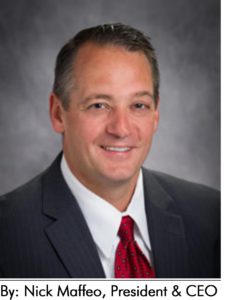
People expect that the money they keep in a bank will be safe. That is certainly a reasonable expectation.
Bad news and frightening news always seem to get the most attention. But the good news – the reassuring news – is that today, in 2023, the American banking system is very strong and American banks are generally very safe.
That was not true before President Franklin Roosevelt signed the Glass-Steagall Act into law in 1933 – creating the Federal Deposit Insurance Corporation, also known as the FDIC.
The Federal Reserve has an excellent history of this very important development on their web site at FederalReserveHistory.org. The bottom line is that the purpose of the FDIC was to “restore confidence” in the banking system at a time during the Great Depression when many people had lost confidence in banks.
FDIC deposit insurance has made all the difference in the world, with depositors being assured that their accounts are covered up to the FDIC limits – currently $250,000. (The government does have the option to raise that amount in an emergency, as we recently saw with the Silicon Valley Bank situation.)
People who have money in DIF member banks here in Massachusetts have a unique extra level of protection. The DIF is the Depositors Insurance Fund and it covers deposits above the FDIC limits to 100%. The DIF was created in 1934 and – as they say on their web site – “No one has ever lost a penny in a bank insured by the FDIC and the DIF.”
Bank regulators also do a thorough job making sure banks have appropriate risk management practices in place. Yes, occasionally something comes up that bankers and regulators have not seen before. When that happens, new regulations are created to avoid similar problems in the future. Evolving regulations are an important part of what keeps American banks strong.
So what can you do to help make sure the money you have in a bank is safe?
First, be sure the “bank” your money is in is FDIC insured. Some fin-tech financial services companies and payment apps are not insured. If a company like that goes out of business, customers’ money in accounts at those companies could be lost.
Second, if you have questions about the FDIC insurance limits and how you might be able to structure your bank accounts to protect more than $250,000, call your bank or go see them. It is possible in some circumstances. But there are conditions and it’s important to completely understand what those conditions might mean for you.
Third, for 100% unlimited automatic coverage of both personal and business accounts here in Massachusetts, look for a bank that has both FDIC and DIF insurance. The DIF has a list of its insured member banks at difxs.com.
Most banks are not like Silicon Valley Bank. And some think social media played a role that contributed to SVB’s problems. It could be. But even in that somewhat unusual case, the FDIC stepped in and resolved the problem in a very short time with no losses to depositors.
The vast majority of banks – especially in Massachusetts – are strong and stable. Many have been giving people safe places to save and peace of mind for more than 100 years through every kind of economic situation. That will probably never make the news, but it’s true.
Nick Maffeo is the President & CEO of Canton Co-operative Bank – right next to the Post Office – in Canton. Have a question? Email to info@cantoncoopbank.com.
